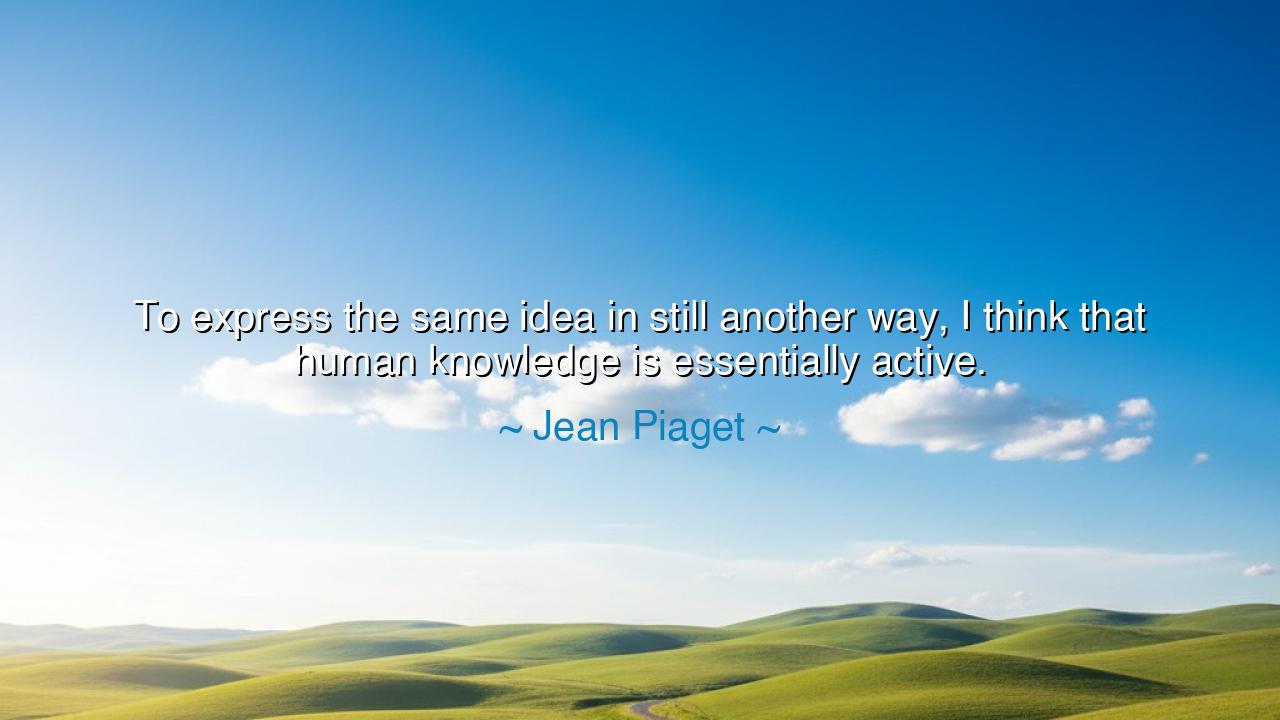
To express the same idea in still another way, I think that human
To express the same idea in still another way, I think that human knowledge is essentially active.






Hear the words of Jean Piaget, the great thinker of the mind’s unfolding, who declared: “To express the same idea in still another way, I think that human knowledge is essentially active.” This saying is not a mere arrangement of phrases but a revelation of the soul of learning itself. It tells us that knowledge is not a stone to be stored away in silence, but a flame that demands air, movement, and action. It is not a passive possession but a living force, a river that flows only when stirred, a seed that grows only when planted in the soil of experience.
To call knowledge active is to awaken us to the truth that learning is born not from memorization alone, but from struggle, from effort, from the ceaseless reaching of the human spirit. The ancients knew this well. For Heraclitus spoke that all things flow, that nothing is stagnant, that the mind, like the world, must ever be in motion. Piaget echoes this eternal truth, reminding us that thought matures not in stillness but in the dance of questioning, seeking, and doing.
Consider the story of Archimedes, the sage of Syracuse. Long did he ponder the mysteries of weight and water, but his discovery did not come while sitting in still reflection. It came in the act of bathing, in the sudden awareness of water displaced, in the cry of “Eureka!” shouted as he leapt into the streets. Here we see that knowledge is not idle; it awakens in the very midst of living, when observation and action ignite together. Archimedes’ triumph reveals Piaget’s truth: the human mind learns best through encounter, through experiment, through motion.
Even in our own age, the lessons of science, art, and history prove the same. Think of Marie Curie, who did not simply accept what she was taught but entered the laboratory, mixed, tested, and labored through danger. Her active pursuit of the unknown unveiled the powers of radium and polonium, discoveries that reshaped medicine and science. Had she been content with passive reception, the treasures of her genius would have remained hidden. Thus her life is a shining testament that knowledge lives only in action.
Piaget, who studied children with the patience of a sage, observed that even the youngest among us learn not by listening alone, but by touching, building, questioning, and experimenting. The child who stacks stones, who asks why the sun sets, who tests the strength of a branch beneath their weight—this child shows us the essence of active knowledge. For the mind is like a muscle; it grows not in comfort, but in the resistance of effort.
What then is the lesson for us, O seekers of wisdom? That to truly learn, we must dare to act. To read without doing is to collect empty shells; to memorize without questioning is to walk through life asleep. The wise one does not sit forever in theory but steps boldly into practice, testing, failing, rising again, until truth takes root.
And what must we do, you who hear these words? Begin each day by engaging the world actively: question what you see, test what you hear, create with your hands what your mind imagines. Do not fear mistakes, for they are the sparks that ignite deeper understanding. Share what you know with others, for teaching is itself an act of learning. Above all, let your knowledge move outward, shaping your choices, your work, your service to others—so that what you know becomes what you live.
Thus let Piaget’s teaching echo across the ages: knowledge is active. It is a river that must flow, a flame that must burn, a force that must act. Do not hoard it in silence. Let it move, let it live, let it transform you—and through you, let it transform the world.






AAdministratorAdministrator
Welcome, honored guests. Please leave a comment, we will respond soon